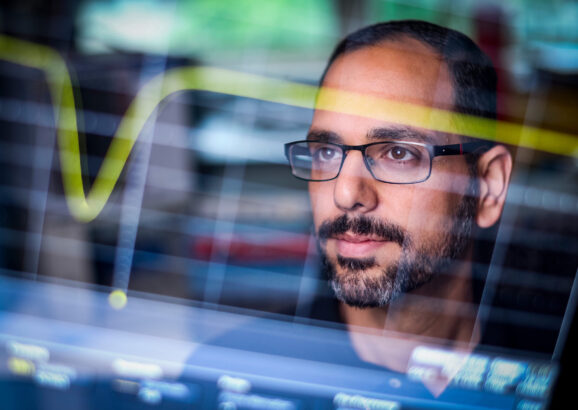Or Hen
Research Interests
Professor Hen’s research focuses on studies of QCD effects in the nuclear medium, and the interplay between partonic and nucleonic degrees of freedom in nuclei. Utilizing high-energy scattering of electron, neutrino, photon, proton and ion off atomic nuclei Hen studies nuclear Short-Range Correlations (SRCs): Temporal fluctuations of high-density, high-momentum, nucleon clusters in nuclei. Due to their overlapping quark distributions and strong interaction, SRC pairs serve as a bridge between low-energy nuclear structure, high-density nuclear matter, and high-energy quark distributions (the EMC effect); with important consequences for strong-interaction physics, hadronic structure and astrophysics.
Hen and collaborators conducted experiments at the US based Thomas-Jefferson and Fermi National Accelerator Laboratories, as well as other accelerators around the world, where they study the structure and characteristics of SRC pairs and examined their effect on various topics in nuclear, particle, atomic and astrophysics.
Looking ahead, Hen is focusing on the new frontier of QCD research at the Electron-Ion Collider facility currently under construction by the Brookhaven and Thomas-Jefferson National Labs. As part of this effort Hen co-led the ECCE consortium, that produced the reference design for the EIC’s main detector, and later co-founded the ePIC collaboration, as a member of its formation steering committee. Hen currently serves on the chair-line of the EIC Users Group and continues collaborating with ePIC to construct the EIC.
Biographical Sketch
Or Hen grew up in Moshav Even-Sapir, in the countryside of Jerusalem, Israel. He received his undergraduate degree in physics and computer engineering from the Hebrew University and earned his PhD in experimental physics at Tel-Aviv University. Hen was an MIT Pappalardo Fellow in Physics from 2015 to 2017, before joining the MIT physics faculty in July 2017. Hen was named the Class of 1956 Career Development Assistant Professor of Physics in 2021, and promoted to Tenured Associate Professor in 2023.

Or Hen: Getting to the core of the matter
To understand how everything from atoms to neutron stars behave requires “abstracting away the details to see main principles that drive everything.”
Awards & Honors
- 2022 // American Physical Society (APS) Fellow "For using eA and pA hard reaction measurements to advance our knowledge of short-range correlated nucleon pairs in nuclei and their effects on nuclear and nucleon structure."
- 2021 // Appointed Class of 1956 Career Development Associate Professor of Physics (MIT)
- 2020 // Sloan Research Fellowship
- 2019 // Stuart Jay Freedman Award in Experimental Nuclear Physics (APS) "For innovative, wide-ranging experiments that found important manifestations of nuclear neutron-proton short-range correlations."
- 2019 // Early Career Research Program Award, U.S. Department of Energy’s Office of Science
- 2019 // IUPAP Young Scientist Prize in Nuclear Physics "“For extending our knowledge and understanding of short range correlations in nuclei, and for the discovery of a remarkable linear relationship between high-momentum correlations and the deviation of the quark momentum in a heavy nucleus.”
- 2018 // Guido Altarelli Award "For his role in uncovering a striking relation of the nuclear EMC effect and the strength of nucleon-nucleon correlations, with implications for the constraint of the down and up quark distribution ration at large x."
- 2018 // Professor Amar G. Bose Fellowship (MIT) "Project: Beyond Standard Practices<&emdash;>An innovative method for identifying new particles"
- 2016 // Fermi Lab Intensity-Frontier Fellowship
- 2016 // Jefferson Science Association Dissertation Prize
- 2015 // Rothschild Fellowship
- 2015-18 // MIT Pappalardo Fellowship
- 2015 // Israeli Physics Society Dissertation Prize
- 2013 // A. Pazi Award of the Israeli Council for Higher Education
- 2011 // Y. Eisenberg Prize of Tel-Aviv University
Key Publications
-
A. Schmidt, J.R. Pybus, R. Weiss, and E.P. Segarra et al. (CLAS Collaboration), “Probing the core of the strong nuclear interaction”, Nature 578, 540 (2020).
-
B. Schmookler, M. Duer, A. Schmidt, and O. Hen et al. (CLAS Collaboration), “Modified Structure of Protons and Neutrons in Correlated Pairs”, Nature 566, 354 (2019).
-
M. Duer and O. Hen et al. (CLAS Collaboration), “Probing High Momentum Protons and Neutrons in Neutron-Rich Nuclei”, Nature 560, 617 (2018).